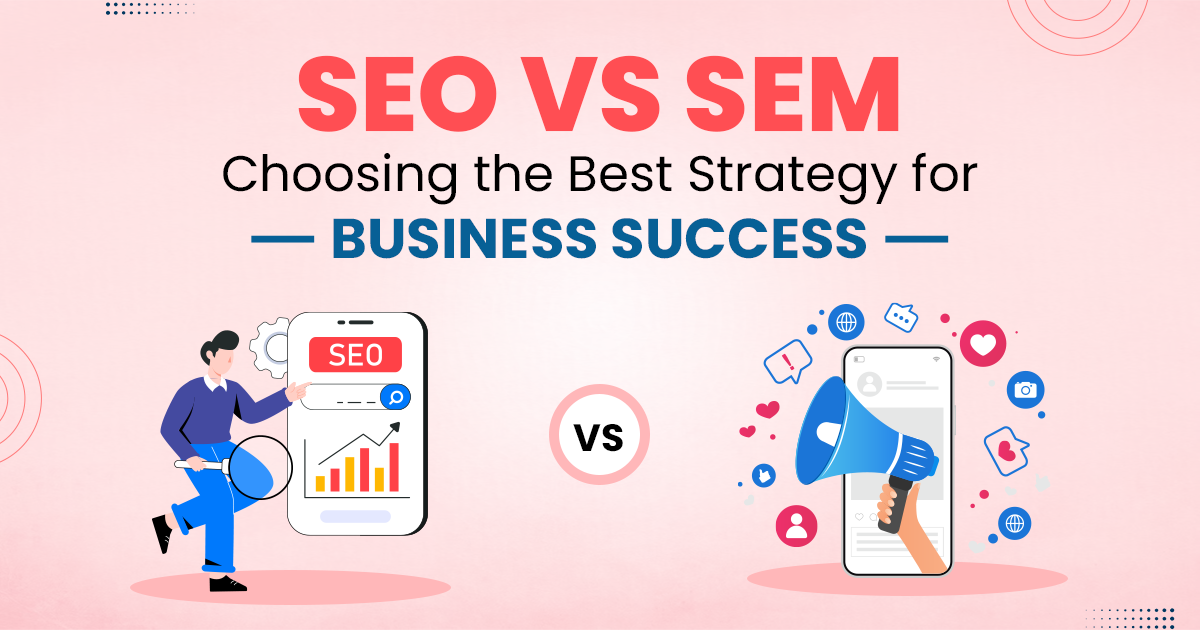In the world of digital marketing, the debate around SEO vs SEM continues to shape how businesses approach their online growth strategies. The two strategies have different uses, but knowing more about their importance helps you make a decision based on which one best supports your business goals. This blog will take you through the differences, benefits, and scenarios where each can shine to guide you in the right decision.
Understanding SEO: The Backbone of Organic Growth
SEO is an abbreviation for Search Engine Optimization. Its strategies simply maximize the visibility of your website in organic search results. This approach optimizes the content, keywords, and technical elements on your site to rank higher on search engines like Google.
Some of the main aspects of SEO:
Keyword Optimization: It ensures that the website is aligned with the intent of the search.
Content Creation: Values are being generated in terms of blogs, guides, and pages.
Backlink Building: Gains credibility with the help of external links.
For professional aid in enhancing your website to get organic growth, the Best SEO Company can prove very helpful in delivering great results that stay long.
Understanding SEM: The Paid Strategy of Having Instant Visibility
SEM or Search Engine Marketing is paid ads alongside organic efforts to make maximum visibility. It is through PPC campaigns, display ads, and remarketing techniques to increase traffic quickly.
What is SEM in Digital Marketing? It’s the process of advertizing your business by running paid ads on Google Ads.
Benefits of SEM:
Instant Outcomes: Know you get instant visibility within search results.
Targeted Campaigns: Focus on any demographics and behaviors.
Scaleable: Adjust ad spend in line with your business needs.
If you’re looking to take your SEM campaigns to the next level, look into our Google Ads Services, helping you achieve measurable results and improve your online authority.
SEO vs SEM: The Key Differences Explained
When deciding between SEO and SEM, it’s essential to understand their differences:
Feature SEO SEM
Cost No direct cost for organic clicks Paid campaigns with bidding
Timeline Long-term results Immediate visibility
Sustainability Ideal for steady traffic growth Perfect for time-bound goals
Is it more important to have SEO or SEM? Both are essential, but their applicability would depend on the goals. Implement SEO for long-term results and SEM for fast results.
Google SEO vs SEM: Right Choice
What is the Difference Between Google SEO and SEM?
Google SEO aims for ranking at the top of organic search results, using optimization techniques. However, SEM uses paid strategies to rank at the sponsored sections of search results.
When to apply Google SEO:
For long-term credibility
To cut down paid dependency
When to apply Google SEM:
For product launch and seasonal campaigns
To outsmart competitors for keywords on which they outbid you
Selection of Right Strategy for Your Business
Both SEO and SEM are effective in online marketing, but its application will depend on:
Your Budget: SEO is highly cost-effective; SEM calls for ad spend
Your Timeline: SEO is time-consuming, while SEM offers quick results.
Your Goals: SEO is best for steady growth, while SEM will serve well for same-day visibility. Combining both can maximize your online reach and help grow your business successfully.
FAQs
What are the advantages of SEO?
These will provide sustainable traffic, enhance brand credibility, and provide a cost-effective means of growing your online footprint.
What is SEO?
SEO stands for Search Engine Optimization. SEO is the process of optimizing the website so that it ranks within the organic search results. It is, therefore, indispensable for long term business results to be achieved.
What are the Benefits and Challenges of SEO?
Some of the benefits include constant traffic while building trust. Some challenges include time and competition over keywords.
What are the long-term benefits of SEO?
SEO ensures continuous visibility, increased brand value, and minimized reliance on paid advertisement in the long run.


By bubbleworld.in
April 12, 2025I am really impressed with your writing talents as smartly as with the
layout on your weblog. Is this a paid subject or did you
customize it your self? Anyway keep up the nice high quality writing, it is
rare to look a nice weblog like this one today.
Snipfeed!